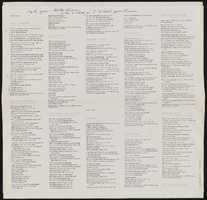Search the Special Collections and Archives Portal
Search Results

Interview with Julia Occhiogrosso, June 17, 2004
Date
Archival Collection
Description
Text

Interview with George Robert Maynard, Sr., February 16, 2005
Date
Archival Collection
Description
Text
Flora and Stuart Mason Photographs and Event Programs
Identifier
Abstract
Collection is comprised of photographs of Las Vegas, Nevada community leaders Flora and Stuart Mason and three event programs from Temple Beth Sholom (Las Vegas, Nevada). Materials date from approximately 1965 to 2010.
Archival Collection
Jean Ford Papers
Identifier
Abstract
The Jean Ford Papers (1958-1996) include political documents, campaign materials for Jean Ford's political campaigns, and materials pertaining to campaign issues such as health services, general improvement districts, and parks and recreation. There is extensive material on Red Rock National Conservation Area, Lake Mead National Recreation Area, and the National Issues Forum. Women's issues cover the years 1964-1981 and contain information relating to the League of Women Voters, Equal Rights Amendment (ERA), and International Women's Year (IWY), as well as Anti-ERA and Anti-IWY materials.
Archival Collection

Mario Sandoval interview, December 6, 2018: transcript
Date
Archival Collection
Description
Interviewed by Claytee White. Mario and his six siblings were reared by a single mother who taught him all of the family recipes. Moving to Las Vegas at four years of age Mario remembers moving into a black neighborhood where the family was not welcomed. All windows in their home were broken into the first night. The family moved the next day. Though the new house was still in an African American neighborhood, they were protected by Vera, their black babysitter. Mario developed the intense work ethic of his mother, and after working in several strip casinos, found his home at the Horseshoe, today's Binion's. He has been there for 33 years; first as a busboy and then becoming a waiter. He is a Culinary Union trained shop student who picketed his beloved work place for ten months during a 1980's labor dispute. His work in life and union benefits have made his a very good life.
Text

Transcript of interview with Lori Chenin-Frankl by Barbara Tabach, June 7, 2016
Date
Archival Collection
Description
Lori provides a wonderful narrative of her Judaism, her love of teaching children and her devotion to family and music. She talks about growing up in Las Vegas and becoming a bat mitzvah, a rarity for girls in 1973. Throughout her life, including the period where she moved around with her Air Force husband, she sought Jewish connections to help her feel at home no matter where she was.
Text

Diane Orgill oral history interview: transcript
Date
Archival Collection
Description
Oral history interview with Diane Orgill conducted by Claytee D. White on March 30, 2018 for the Remembering 1 October Oral History Project. In this interview, Diane Orgill, a volunteer with Red Cross, discusses her experience on the night of the October 1, 2017 mass shooting in Las Vegas, Nevada. She speaks of her role as a Red Cross representative at the Emergency Operations Center and the efforts of the Red Cross command center to provide a sense of order in the chaos. She describes some of the support provided to the survivors through the Family Assistance Center and the Disaster Action Team, giving an in-depth explanation of how these sections of the Red Cross function.
Text

Anita Tijerina Revilla oral history interview: transcript
Date
Archival Collection
Description
Oral history interview with Anita Tijerina Revilla conducted by Marcela Rodriguez-Campo on October 09, 2018 for the Latinx Voices of Southern Nevada Oral History Project. In this interview, Revilla discusses her early life in San Antonio, Texas. She talks about her decision to make education a priority, figuring out the college application process on her own, and her initial interest in social justice. Revilla talks about how her critical consciousness was developed, and her pedagogical approach to teaching. Revilla describes her role in the 2006 May Day march, advocating advocating for the queer community, and disrupting oppressive systems to increase educational access for students. Lastly, Revilla discusses ethnic studies and the history of inequality in the United States.
Text


